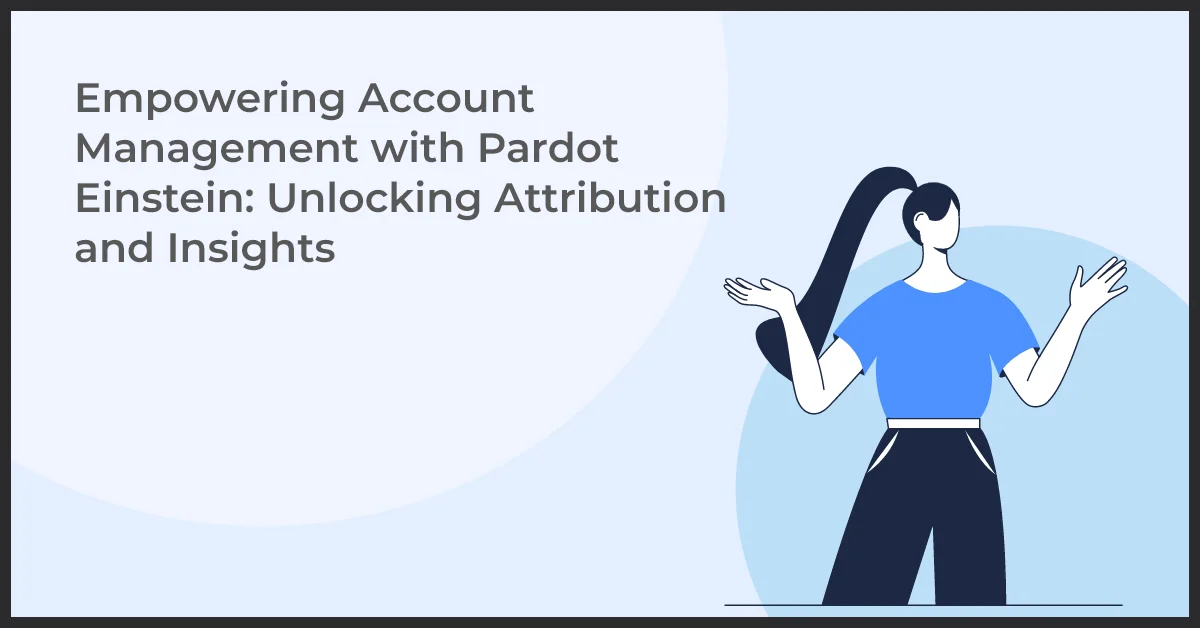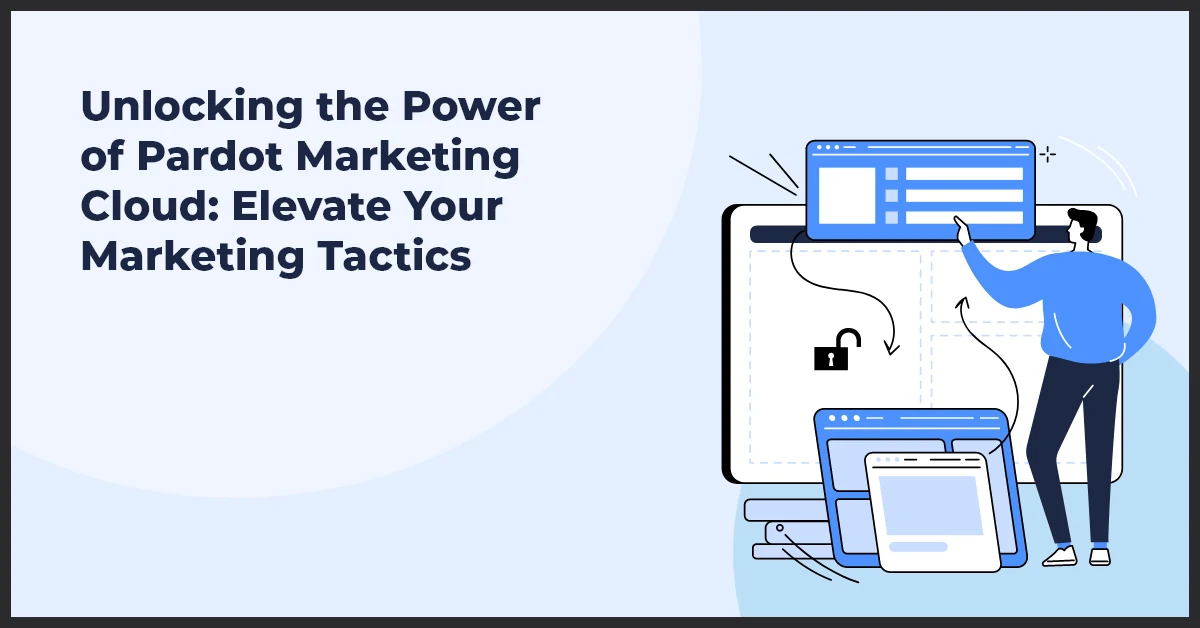Pardot Einstein for Account Management: Unlock Attribution & Insights

Published on: July 18, 2023
Updated on: February 28, 2025
2365 Views
- Pardot
7 min read
Effective account management is essential for businesses to thrive in today's digital marketing landscape. Pardot Einstein, a powerful tool, offers marketers a range of features and capabilities to streamline their account management processes.
Pardot Einstein is an advanced platform combining artificial intelligence and machine learning to enhance account management strategies. It gives marketers valuable insights and data-driven solutions to optimize marketing efforts and improve customer experiences.
With Pardot Einstein, marketers can comprehensively understand their customers, track their interactions, and identify the most impactful marketing campaigns. This enables them to make informed decisions, improve targeting, and drive business growth.
By harnessing the capabilities of Pardot Einstein, marketers can unlock the true potential of their account management practices, deliver personalized experiences, and easily achieve their marketing goals. In the following sections, we will explore the key components and benefits of Pardot Einstein for effective account management.
Understanding Einstein Attribution: Key Components
To understand the power of Pardot Einstein Attribution, let's explore how it works. There are two key components involved: touchpoints and associated campaigns.
Touchpoints
Touchpoints refer to the various interactions a customer has with your marketing campaigns. These interactions include website visits, email opens, ad clicks, and more. Pardot Einstein Attribution tracks and analyzes these touchpoints to understand the customer journey and measure the impact of each touchpoint on generating leads or sales.
Associated Campaigns
Associated campaigns are marketing campaigns that are linked to specific touchpoints. Pardot Einstein Attribution establishes connections between touchpoints and associated campaigns, allowing marketers to accurately attribute campaign effectiveness and understand which campaigns contribute most to conversions.
Implementing Pardot Einstein Attribution
Implementing Pardot Einstein Attribution involves a few essential steps:
- Data Mapping: Marketers must ensure that the data from their marketing campaigns and touchpoints is properly mapped to Pardot Einstein. This mapping enables accurate tracking and attribution of touchpoints to the appropriate campaigns.
- Attribution Models: Pardot Einstein offers different attribution models, such as first-touch, last-touch, and multi-touch attribution. Marketers can select the model that best suits their business goals and aligns with their account management strategy.
- Rules and Customization: Marketers can define rules and customize attribution credit assignments based on their specific requirements. This allows them to prioritize certain touchpoints or campaigns, ensuring the attribution accurately reflects their marketing efforts.
Leveraging Einstein Attribution in B2B Marketing Analytics
Pardot Einstein Attribution provides valuable insights that can be leveraged in B2B marketing analytics:
- Accurate Performance Measurement: With Pardot Einstein Attribution, marketers can measure the true impact of their marketing campaigns. They can identify the touchpoints that generate the most leads or revenue, enabling them to focus their efforts on the most effective strategies.
- Customer Journey Analysis: Pardot Einstein Attribution helps marketers understand the customer journey from the first touchpoint to conversion. By analyzing the touchpoints, marketers can identify patterns and optimize their marketing campaigns to better align with the customer's decision-making process.
- Data-Driven Decision Making: Pardot Einstein Attribution empowers marketers to make data-driven decisions. By clearly understanding the attribution data, marketers can allocate resources effectively, optimize their campaigns, and maximize their return on investment.
By leveraging Einstein Attribution in B2B marketing analytics, marketers can accurately measure campaign performance, analyze the customer journey, and make data-driven decisions to enhance their account management strategies.
Pardot Einstein Campaign Insights: Key Components
Pardot Einstein Campaign Insights provides marketers valuable data-driven insights to optimize their marketing campaigns. Let's explore the key components of Pardot Einstein Campaign Insights. Here is how it works.
1. Data Origin
Pardot Einstein Campaign Insights starts by integrating and enriching data from various sources. It collects data from marketing channels like email campaigns, social media, and website interactions. This ensures marketers have a comprehensive and holistic view of their campaign performance.
2. Insight Location
Pardot Einstein Campaign Insights identifies the location of these insights within the marketing data. It categorizes the data into segments: lead generation, engagement metrics, and conversion rates. This allows marketers to focus on specific areas and gain deeper insights into their campaign effectiveness.
3. Insight Types
Pardot Einstein Campaign Insights provides various types of insights to marketers. These insights can include customer behavior analysis, campaign ROI calculations, and predictive analytics. By offering a range of insights, Pardot Einstein enables marketers to make informed decisions and take actions that drive marketing success.
Enabling Campaign Insights
To enable Pardot Einstein Campaign Insights, marketers need to follow these steps:
1. Data Integration
Marketers should ensure their marketing data is integrated into the Pardot Einstein platform. This integration may involve connecting various marketing tools, such as CRM systems, email marketing platforms, and advertising platforms. By consolidating data from multiple sources, marketers can gain a unified view of their campaigns.
2. Data Enrichment
Data enrichment involves enhancing the collected data with additional information. This can include enriching contact records with demographic data, appending lead scores, or adding firmographic data to enhance segmentation. By improving the data, marketers gain a deeper understanding of their target audience. They can create more personalized and targeted campaigns.
Leveraging Pardot Einstein Campaign Insights for Marketing Success
Pardot Einstein Campaign Insights offers several benefits for marketers:
1. Campaign Performance Analysis
Pardot Einstein Campaign Insights allows marketers to analyze the performance of their campaigns in real time. They can track key metrics like open rates, click-through rates, and conversion rates to assess the effectiveness of their campaigns. This analysis helps marketers identify underperforming campaigns and make data-driven decisions to optimize future campaigns.
2. Data-Driven Optimization
By leveraging Pardot Einstein Campaign Insights, marketers can optimize their marketing efforts based on actionable insights. They can identify trends, patterns, and customer preferences, allowing them to create more targeted and personalized campaigns. This optimization leads to better engagement, higher conversion rates, and increased marketing success.
3. Predictive Analytics
Pardot Einstein Campaign Insights also offers predictive analytics capabilities. Marketers can predict future outcomes by analyzing historical campaign data and customer behavior patterns and making proactive marketing decisions. This empowers marketers to allocate resources effectively, anticipate customer needs, and stay ahead of the competition.
By understanding the data origin, insight location, and insight types, marketers can enable and leverage these insights for marketing success. Pardot Einstein Campaign Insights enables data-driven optimization, campaign performance analysis, and predictive analytics, empowering marketers to achieve their marketing goals confidently.
Key Takeaways
- Pardot Einstein for Account Management unlocks attribution and insights, enabling marketers to streamline processes and make data-driven decisions.
- Einstein Attribution tracks customer touchpoints and associated campaigns, providing accurate performance measurement and customer journey analysis.
- Campaign Insights offers real-time performance analysis, data-driven optimization, and predictive analytics to enhance marketing success.
- Implementing Pardot Einstein involves data mapping, selecting attribution models, and customizing rules to align with specific business goals.
- The platform integrates various data sources, enriches information, and categorizes insights for comprehensive campaign evaluation.
- Pardot Einstein empowers marketers to optimize resource allocation, personalize campaigns, and stay ahead of emerging trends in account management.
Final Thoughts
Pardot Einstein opens up a world of possibilities for marketers regarding attribution and campaign analytics. As marketing attribution and analytics evolve, Pardot Einstein remains at the forefront, enabling marketers to make data-driven decisions and achieve their account management goals.
By leveraging the power of Pardot Einstein, marketers can stay ahead of emerging trends, unlock new insights, and drive marketing success in an ever-changing landscape.
Pardot Einstein revolutionizes account management by providing accurate attribution and comprehensive campaign insights. By implementing Pardot Einstein Attribution and leveraging Pardot Einstein Campaign Insights, marketers can make informed decisions, optimize their marketing strategies, and confidently achieve their account management objectives.
Want to optimize your existing Pardot instance or set up one from scratch to dive into the future of marketing attribution and campaign analytics? Then let’s talk! Growth Natives offers comprehensive marketing automation with hundreds of satisfied clients across the globe.
Email us at info@growthnatives.com or visit our website to learn more about our services.
Frequently Asked Questions
Pardot Einstein features for account management include Account-Based Marketing (ABM), lead scoring and grading, and dynamic content personalization.
Yes, Pardot Einstein provides:
- Valuable insights for account-based marketing.
- Allowing marketers to measure engagement.
- Campaign performance.
- Revenue generated from specific accounts.
Pardot Einstein improves lead nurturing through behavioral tracking, personalized automation, and AI-powered lead scoring and grading, ensuring leads receive relevant and timely content.
Pardot Einstein can integrate with other CRM and analytics platforms, including Salesforce CRM, for seamless data synchronization and enhanced data analysis and reporting capabilities.



